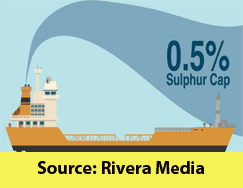Now battered by a giant drop in container ship sailings in and out China and more due the coronavirus, the perpetually financially beleaguered ocean container lines are unlikely to get fully compensated by shippers for the cost of compliance for new International Maritime Organization (IMO) mandates on sulfur emissions.
The new IMO rules, which went into effect on Jan. 1, require that ocean cargo ships dramatically reduce sulfur emissions by either switching from bunker fuel to much more expensive low sulfur diesel, or installing expensive scrubbing systems than cost millions of dollars per ship.
Supply Chain Digest Says... |
 |
Officials around the world are expected to start getting tough on enforcement of the new rules starting in March, after a grace period of sorts since the beginning of the year. |
 |
What do you say? |
| Click here to send us your comments |
| |
| Click here to see reader feedback |
|
|
From the time the IMO mandates were issued in 2018, there were concerned by many in the industry that if financially weak container carriers had to absorb a significant share of the new costs instead of passing them on to shippers, the result could be outright failures at some carriers and more mergers and acquisitions in the sector.
Peter Sand, chief shipping analyst at BIMCO, the world's largest international shipping association, says container freight rates indeed have not risen sufficiently to cover the price of compliance.
As reported on TheLoadstar.com web site, Sand added that "The hike this year was not enough, with the market offering little support to carriers attempting to pass these costs on fully."
Sand added that container lines' surcharge mechanisms had been "widely criticized for not being transparent, or for being too complex to understand, leading to carriers having trouble implementing them".
And, Sand says, even if carriers are able to get shippers to pay additional surcharges for use of the new fuel, "Those that have succeeded may have done so by lowering the underlying freight cost such that the total price shippers pay has not changed much."
Even giant Maersk Line, the largest container carrier, is now saying that it classifies a failure to pass on the extra cost of the IMO sulfur rules cap ias a high risk in latest overall business strategy a document, with a risk of probability of 25%.
That percentage may well be too low.
Meanwhile the battle over use of scrubbers continues on, as the technology involves discharging the water used for eliminating the sulfur from air emissions back into the sea.
The discharge naturally enough contains sulfur, though at levels proponents claim is not damaging to the ecosystem.
What's more, it appears scrubbers are performing better than the low sulfur fuels. The IMO rules preduced the limit on sulfur emissions for maritime shipping from 3.5% to 0.5%, but scrubber technology is capable of reducing the level to just 0.1%.
(See More Below)
|
CATEGORY SPONSOR: SOFTEON |
|
|
|
|
|
 Nevertheless, environmental group criticism of the scrubber approach has resulted in more than 80 ports around the world banning the use of the systems in their territorial waters, where ships must switch to low sulfur fuels even though they have the scrubbers. Nevertheless, environmental group criticism of the scrubber approach has resulted in more than 80 ports around the world banning the use of the systems in their territorial waters, where ships must switch to low sulfur fuels even though they have the scrubbers.
Officials around the world are expected to start getting tough on enforcement of the new rules starting in March, after a grace period of sorts since the beginning of the year.
For example, now ships without scrubbers found to be merely storing - not just using - high-sulfur, noncompliant fuel will be in violation of the regulation.
The penalties can be steep.
The US Coast Guard says that ship owners may first receive a warning letter for violating the IMO 2020 regulation. But it could also issue an owner a "Notice of Violation," which could include penalties of $2,000 to $10,000. Owners could potentially also be liable for civil penalties assessed by the US Environmental Protection Agency of over $75,000 per violation per day.
How this all plays out in terms of the financial health of container lines remains to be seen, but the prospects for carriers appear poor.
Do you think carriers wil even get back the full IMO compliance costs? Let us know your thoughts at the Feedback section below.
Your Comments/Feedback
|

